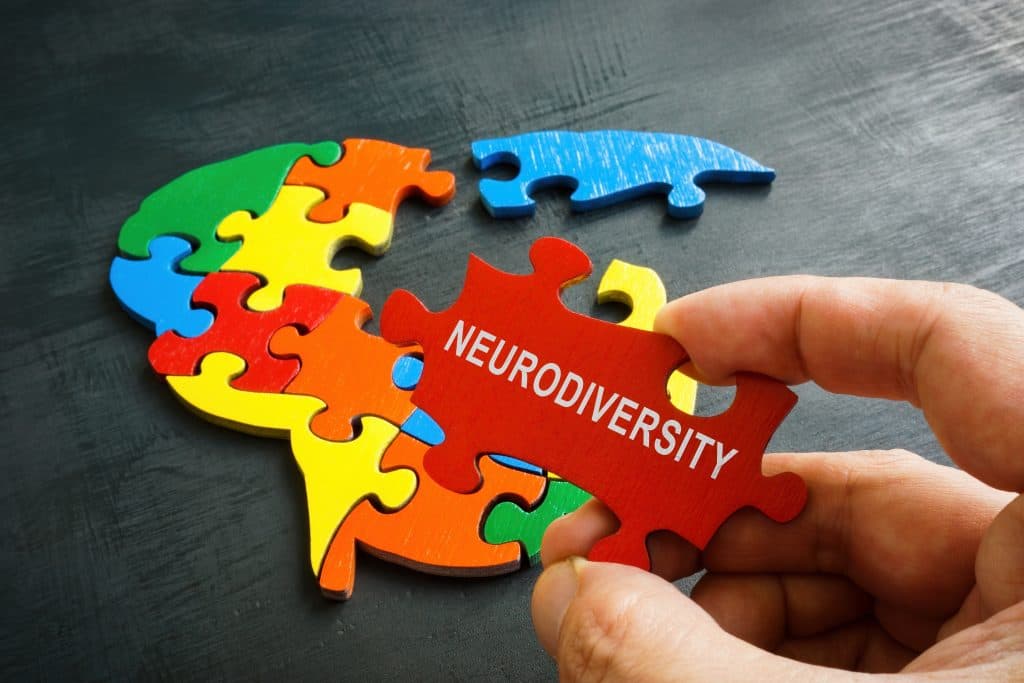Neurodivergence: it’s a term that’s been gaining momentum lately, but what is neurodivergence really? Well, simply put, it refers to the way in which some people’s brains are wired differently from the majority. And guess what? That’s perfectly okay, it’s more than okay… it’s amazing! Think of the world’s most creative minds, individuals like Albert Einstein, who revolutionised physics; Leonardo Da Vinci, whose art and inventions were far ahead of their time; or contemporary figures like Steve Jobs, whose vision transformed technology. Even artists like Lady Gaga and Björk have carved their own paths in music and fashion with their unique voices and creative brilliance. These individuals didn’t conform to expectations; they harnessed their differences to create something truly remarkable. Neurodivergence works the same way, when you stop fighting it and start embracing it, you might just uncover your own unique brilliance. Just like these remarkable minds, people with neurodivergent traits can leave an indelible mark on the world.
What is Neurodivergence?
At its core, neurodivergence is the idea that not all brains work the same way, and that’s perfectly natural. The term includes a variety of conditions, from ADHD to autism, dyslexia, dyspraxia, and many more. Neurodivergence isn’t about fixing something broken, it’s about recognising and celebrating the ways in our brains can differ from the “typical” model. Some neurodivergent people have incredible strengths, like creativity, attention to detail, and problem-solving skills. But just like a diamond in the rough, it takes some polishing and care to truly unlock the full potential of a neurodivergent brain. The key is finding strategies that work for you, whether that’s through therapy, lifestyle adjustments, or simply learning how to embrace your unique way of thinking.

Why Embracing Neurodivergence Matters
The world is built for neurotypical people. It’s designed for those who can focus effortlessly, manage their emotions with ease, and seamlessly fit in with the mainstream social norms. But for those of us who are neurodivergent, this world can often feel like trying to swim upstream. And that’s where the magic happens, because being neurodivergent means you can bring something to the table that no one else can. Think about it: the world didn’t need another “normal” thinker. It needed the Albert Einsteins and the Lady Gagas, the disruptors, the creators, the ones who weren’t afraid to be different.
Unlock peak brain performance with science-backed biohacks. Join free now & get your guide for just £4.99 (45% off)!

When we embrace our neurodivergence, we stop trying to fit ourselves into a box that doesn’t work. We find the strategies and tools that allow us to thrive, not just survive. This is where therapy, supplements, exercise, and sleep hygiene come in, all of which help us find balance and give our minds the best chance to flourish. You see, harnessing your neurodivergent traits isn’t about changing who you are. It’s about learning how to live your life in a way that brings out the best of you. Think of it like learning to steer a sports car, when you know how to handle it, it can fly.
How Neurodivergence Feels
For those who experience neurodivergence, life can feel like a constant balancing act. Some days, everything clicks and works perfectly, and other days, it’s like trying to juggle while walking on a tightrope. But the key is understanding that feeling overwhelmed or like you don’t fit in doesn’t mean something’s wrong with you. It just means that your brain is doing its thing in its own unique way.
And it’s okay to feel overwhelmed sometimes. It’s okay to ask for help, to get the right support, and to take things at your own pace. Neurodivergence doesn’t need fixing to make you feel whole; it’s about embracing it, discovering strategies that work for you, and tapping into your own potential. When you stop fighting the tightrope walk and start learning to actually walk it, you might just find that you can amaze others, and yourself, in ways you never imagined.
Types of Neurodivergence
There’s a whole range of neurodivergent conditions out there, and it’s important to understand that each one is unique to the individual. Here are a few of the most common types of neurodivergence:
ADHD
- ADHD: ADHD (Attention Deficit Hyperactivity Disorder) is one of the most well-known types of neurodivergence. For those with ADHD, life often feels like it’s moving at a hundred miles an hour while everyone else is strolling down the street. Hyperactivity, impulsivity, and inattention can make things feel chaotic. But instead of seeing it as a negative, let’s think of it like a sports car engine that needs the right gears and maintenance to go smoothly. Sure, it’s loud, but with the right strategies, that engine can power through obstacles in unique and powerful ways.
Autism Spectrum Disorder (ASD)
- Autism Spectrum Disorder (ASD): Autism is a spectrum, meaning it can look different in every individual. People on the autism spectrum may struggle with communication, social interactions, or sensory sensitivities, but they can also have remarkable strengths, like attention to detail, pattern recognition, and creativity. When harnessed correctly, autism can be a superpower in certain environments, especially in fields that require precision and innovation.
Dyslexia
- Dyslexia: People with dyslexia struggle with reading and writing. Words might jump around on the page, or sentences seem to blur together. But dyslexia doesn’t mean a lack of intelligence. Many neurodivergent people with dyslexia excel in areas like problem-solving, creative thinking, and even art. Techniques such as using audio books or text-to-speech software can help manage the challenges that come with dyslexia. These can even turn reading into an enjoyable activity.
Dyspraxia
- Dyspraxia: Dyspraxia, or Developmental Coordination Disorder, affects motor coordination, making everyday tasks like tying shoelaces or buttoning a shirt difficult for some. But people with dyspraxia often excel in areas requiring thinking outside the box, strategy, and resilience. Overcoming physical challenges can build determination and lead to huge accomplishments.
Tourette Syndrome
- Tourette Syndrome: Tourette Syndrome is often mischaracterised and misunderstood. It’s not just about tics; it’s about a neurological condition that can make someone’s body act in ways they don’t control. However, with proper strategies and therapy, people with Tourette’s can manage these symptoms. There are treatments, like Cognitive Behavioural Therapy (CBT) and habit reversal therapy, that help people reduce their tics and increase their sense of control.
Sensory Processing Disorder (SPD)
- Sensory Processing Disorder (SPD): SPD refers to how the brain processes and responds to sensory input. Some people with SPD might be overly sensitive to light, sound, or touch, while others might not respond to certain sensory cues at all. Understanding sensory needs and creating the right environment can make a world of difference for individuals with SPD.
Obsessive-Compulsive Disorder (OCD)
- Obsessive-Compulsive Disorder (OCD): OCD can manifest as persistent, intrusive thoughts or compulsive behaviours designed to alleviate anxiety. People with OCD can experience significant distress from these repetitive behaviours, but therapies like Exposure and Response Prevention (ERP) as part of CBT can help them manage and reduce these symptoms.
Neurodivergence and Therapy: Why Therapy Still Matters
It’s true: embracing neurodivergence and learning how to harness your superpower is a key part of thriving. But, it’s also important to recognise that some of the challenges that come with neurodivergence may need extra support to manage. This is where therapy, sleep hygiene, nutrition, and exercise come in.
Therapies like Cognitive Behavioural Therapy (CBT) and behavioural therapies help develop coping strategies for managing ADHD, anxiety, and other neurodivergent traits. Additionally, adjusting your diet to support brain health, improving your sleep, and finding ways to exercise that suit your needs can make a world of difference. So, while neurodivergence isn’t something to “fix,” the right support can help harness your mind’s true power.
Harnessing Your Neurodivergence: Not About “Fixing” but Thriving
Now, let’s dive into something that could really get your wheels turning: neurodivergence isn’t something that needs to be “fixed.” Sure, there are challenges. And yes, some traits typical of neurotypical people can feel difficult or unwanted at times. But here’s the thing: when you stop trying to make your brain fit into a box, and you start learning to harness its true potential, you’ll realise something huge, you’ve got a superpower!
Some even believe that neurodivergence could be the next step in human evolution. There are theories suggesting that our brains may have evolved in these unique ways to solve problems and adapt. While this theory remains just that, an idea, it’s an intriguing one. Neurodivergence doesn’t need to be fixed or hidden. It’s something to be embraced and celebrated! It’s about discovering the tools, therapies, and strategies that help you feel at home in your own skin, while thriving in a world that doesn’t always understand you.
Embracing Neurodivergence: Celebrating Your Unique Superpower
At the end of the day, neurodivergence doesn’t need to be “cured” to make you feel whole. It’s not about fitting in. It’s about understanding your brain’s unique wiring. Start celebrating your quirks, and learning how to work with them, not against them. Whether it’s ADHD, autism, or any other form of neurodivergence, your brain is capable of amazing things. When you stop fighting the current and begin harnessing your brain’s true power, you’ll realise something: you, too, have a superpower waiting to be unleashed.
Please note: While we share information and tips to support your journey, we are not health professionals. Always consult a qualified healthcare provider before making any changes to your wellness routine. Your health is personal, and we’re here to help guide you, not diagnose or treat.






